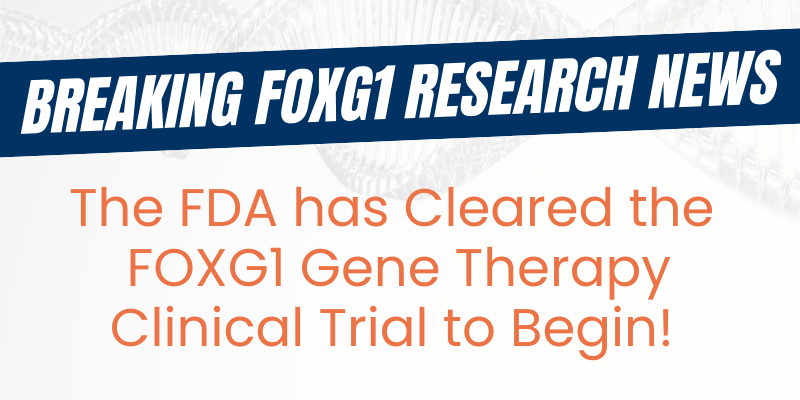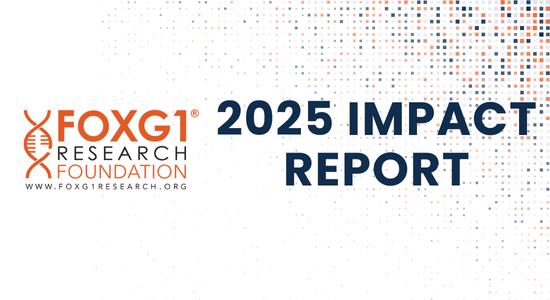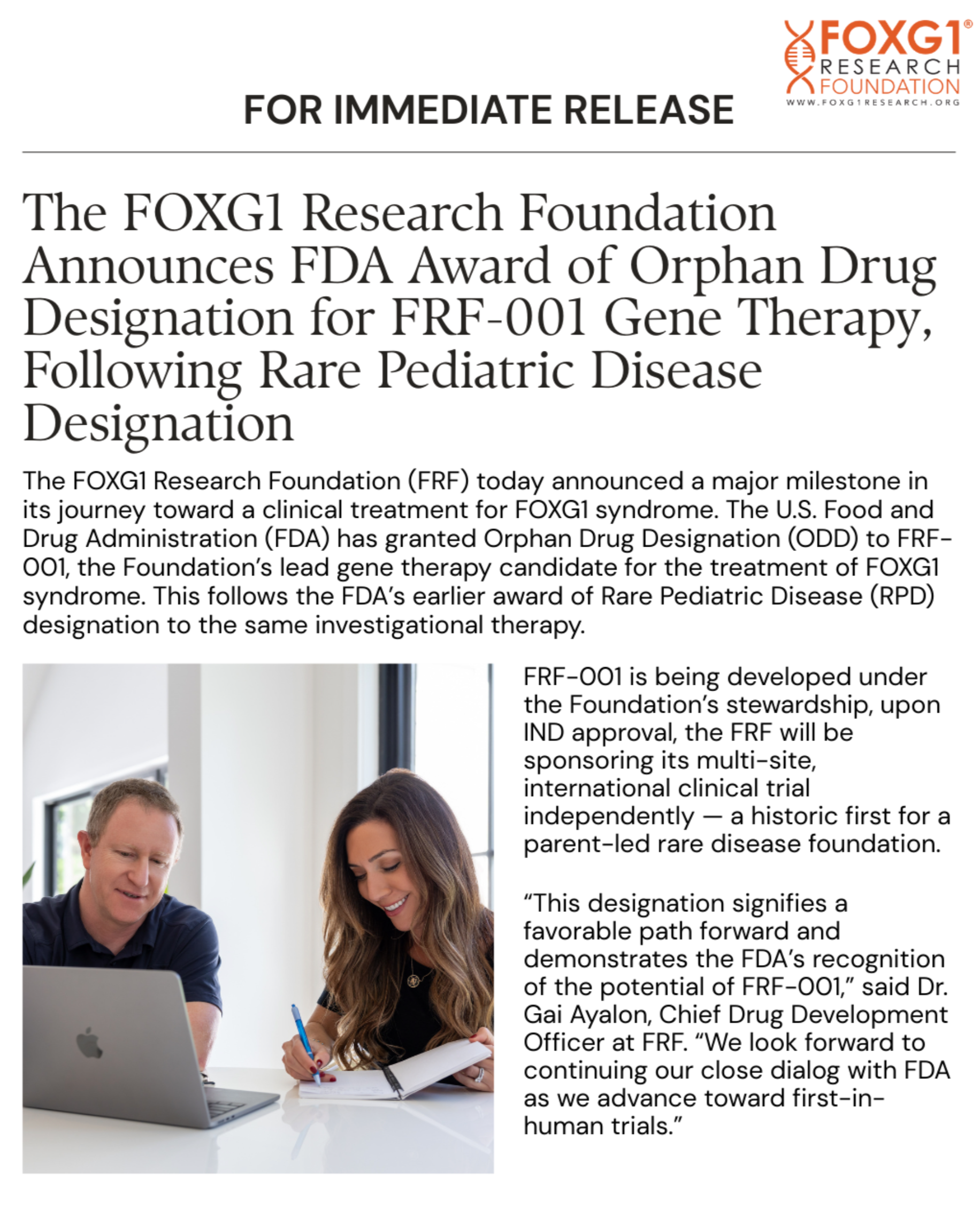The FDA Clears the FOXG1 Gene Replacement Therapy Clinical Trial to Begin!
The FOXG1 Research Foundation announced that the U.S. Food and Drug Administration (FDA) has cleared its Investigational New Drug (IND) application to begin first-in-human clinical trials for FRF-001, the first FOXG1 AAV9 gene replacement therapy. This historic milestone marks the first instance of a parent-led rare disease nonprofit foundation independently sponsoring its own multi-site, international gene therapy clinical trial.
2025 Impact Report : FOXG1 Research Foundation
2025 marked a pivotal year for the FOXG1 Research Foundation.
We successfully completed IND-enabling toxicology studies and submitted an Investigational New Drug (IND) application to the FDA, advancing the first-ever FOXG1 gene therapy toward patient clinical trials in 2026.
As a global, parent-led organization, we continue to demonstrate that families can independently drive rare disease drug development—executing clinical trials with rigor, urgency, and responsibility.
Alongside this progress, we expanded patient care, research, advocacy, and global awareness, while honoring the lives lost within our community and reaffirming why this work cannot wait.
Together with our families, donors, scientific partners, and clinicians, we are building a future where treatment is possible.
FOXG1 Featured on ESPN GameDay and Tom Brady Shares it!
During FOXG1 Awareness Month, our FOXG1 got the Luckiest gift - to see one of our own featured on ESPN!
Lawson Luckie - one of the most sought after tight end prospects in the country coming out of high school in Norcross, Georgia - had an opportunity to play almost anywhere, but only one school provided him the opportunity to be something that the others couldn’t.
As much as Luckie could’ve been the Big Man on Campus, he’s always prioritized an even bigger role, as a big brother to Cannon. It’s a relationship built on love and loyalty that has the Georgia tight end living his life with far more than wins and losses on his mind.
New Publication Reveals Deepest Insight into FOXG1
Published in the Journal of Neurodevelopmental Disorders, this peer-reviewed study presents the largest and most detailed analysis to date of FOXG1 syndrome. The results come from the FOXG1 Citizen Health Natural History Study, led by the FOXG1 Research Foundation’s Chief Clinical Data Officer Elli Brimble, in collaboration with Citizen Health and international key clinical partners.
FOXG1 Syndrome Earns Unique ICD-10 Code: QA00.151
The FOXG1 Research Foundation is proud to share that FOXG1 syndrome has officially been granted its own ICD-10-CM code — QA00151 — by the CDC, effective October 1, 2025. This milestone, years in the making, gives FOXG1 families long-overdue visibility in the healthcare system. With a dedicated code, clinicians can record FOXG1 in medical records, insurers have stronger grounds for coverage, and researchers can more accurately track patients — a powerful step forward for our community and for rare disease recognition.
FDA Awards Orphan Drug Designation for FRF-001 Gene Therapy
The FOXG1 Research Foundation announced the FDA has granted Orphan Drug and Rare Pediatric Disease designations to FRF-001, its lead gene therapy for FOXG1 syndrome. FRF-001 marks a historic first: a parent-led foundation sponsoring its own international, multi-site clinical trial. These designations provide regulatory and financial incentives that help advance FRF-001 toward patients, underscoring FDA’s recognition of this parent-driven effort.
The Shot That Could Change Everything: AAV9 Gene Therapy and the Future for Children Like Crosby
My firstborn son, Crosby, was diagnosed with FOXG1 syndrome. He was just six months old when we got the news. Since then, every night, every weekend, and every ounce of spare energy I’ve had has gone into fighting back against the silence and suffering that FOXG1 imposes on children like my son.
Today, I have something different to share: hope. We’re preparing to bring a first-of-its-kind AAV9 gene replacement therapy for FOXG1 syndrome into the clinic in 2026. That’s not a hypothetical. It’s real. It’s happening. And it could change everything.
New FOXG1 Research Center Publication in Nature!
New FOXG1 Research publication in Nature Communications. Title: The patient-specific mouse model withFoxg1frameshift mutation provides insights intothe pathophysiology of FOXG1 syndrome
The FOX Den for FOXG1 Parents & Caregivers - March Issue
The FOX DEN - March Issue is here with exciting updates for the FOXG1 community! Join our FOXG1 Advocacy Team, celebrate news from the FOXG1 Research Center, and support fundraising efforts for gene therapy. Plus, don’t miss inspiring stories from FOXG1 families making an impact worldwide! Read more.
2024 Impact Report & 2025 Goals: FOXG1 Research Foundation
2024 marked seven years of the FOXG1 Research Foundation. We are a parent-driven, global foundation with the mission to improve the lives of every person affected by FOXG1 syndrome worldwide. We are immensely proud of the organization we have built and the resources we have made available to our community since 2017, but we could never have come this far without our incredible donors and community. Please read the impact of the support in 2024 here.
We kicked off 2024 with a milestone achievement: our CEO was honored as the opening speaker at the inaugural White House Rare Disease Forum. This invitation reflects our growing reputation as leaders in the rare disease space and served as a powerful platform to advocate not only for FOXG1 syndrome but for the unmet needs of all rare diseases worldwide.
Read our 2024 Impact Report here…
Bloomberg Article: When a Miracle Cure Is Left on the Shelf
Modifying DNA was supposed to be a game changer. But drug companies and Wall Street are pulling back from the expensive-to-produce treatments, leaving parents to fund research on their own. When a biotech company promised to study a new treatment for her daughter’s disease, Nicole Johnson was elated. She’d been raising money to research potential cures for FOXG1 syndrome, a rare neurological disorder that had robbed her daughter of the ability to walk or talk. A Dallas-based biotech, Taysha Gene Therapies Inc., agreed to collaborate with her nonprofit on developing a gene therapy for the condition.
But two years ago, Taysha stopped developing the treatment and more than a dozen others. The decision was hardly unusual. Since 2021, drug companies have dropped more than 50 gene therapies. The rising number of abandoned treatments raises questions about whether modifying a patient’s DNA to cure rare diseases can be a lucrative business. And it’s sparked an effort from parents, scientists and entrepreneurs to rescue the drugs that have been left sitting on the shelf.
Based on ‘hope and love,’ UB celebrates opening of FOXG1 Research Center
Hope and love aren’t often mentioned in the same breath as scientific research, but they’re exactly what UB’s FOXG1 Research Center (FRC) was founded on.
“Love for every individual living with FOXG1 syndrome and other neurodevelopmental disorders, as well as their caregivers, and hope that we can find a cure for FOXG1 syndrome and related disorders on the basis of scientific discoveries we are making,” Soo-Kyung Lee, director of the FRC and the parent of a child with FOXG1 syndrome, told a crowd gathered to celebrate the center’s official opening Tuesday.












